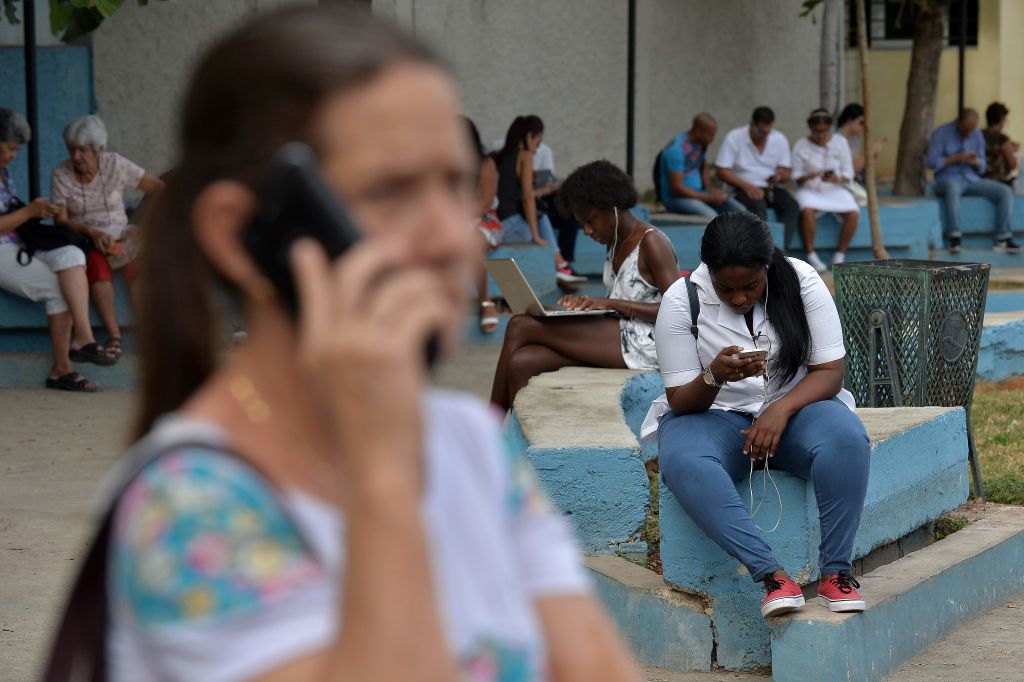Jencarlos Canela urges Biden to take action 1:11
(CNN Spanish) -
The United States government and several international organizations that promote human rights and freedom of the press criticized the new legal framework made official by Cuba to regulate information technologies and penalize actions that the State considers cyberterrorism.
Among them, the fight against "fake news" stands out.
Through its Twitter account, the US State Department said on Tuesday that these new measures are nothing more than censorship and a clear attempt to silence the protests of the Cuban people.
Biden's government announces new sanctions against Cuba after human rights abuses against protesters
The new regulations were approved after the massive protests in July, where thousands of people took to the streets of various cities to complain to the government for the lack of food and medicine and the power cuts.
Several groups of activists denounced that the protests ended with hundreds of arrests and, according to the Government, at least one person died during the demonstrations.
The US authorities also urged that the Cuban government respect the will of the people to speak out and that those who demonstrate not be punished.
CNN has contacted the Cuban embassy in Washington to get a reaction to the State Department's criticism, but has yet to receive a response.
OPINION |
The awakening of Cuba
For his part, the executive director for the Americas of the non-governmental organization Human Rights Watch, José Miguel Vivanco, told CNN on Wednesday that the measure "flagrantly violates international standards on freedom of expression by sanctioning those who publish 'news false 'or affecting' public morality 'or the' prestige of the country '- all vague and ambiguous categories that the government can use with complete discretion to censor critical opinions. "
He added that the new legal framework uses "the excuse of 'cybersecurity' and 'cybercrime' to punish dissent."
advertising
How much do they add, where do they come from and what is the importance of remittances for the Cuban economy
Through a statement, the Cuban Observatory for Human Rights (OCDH) also condemned the approval of the measures and said that it deals with "new norms to repress freedom of expression" and that they will be used to "legalize internet and telephone blackouts." .
"For the OCDH, once again the regime promulgates norms susceptible of such a wide interpretation, that it is evident that they are to persecute those who disagree."
Rosa María Payá: Cubans are not going to stop 0:48
A questionable legal framework
The legal framework that appeared in the Official Gazette consists of a decree-law, a regulation and several resolutions and seeks, among other things, "to increase cybersecurity to safeguard the use of telecommunications services" and information and communication technologies.
It also establishes parameters so that the radioelectric spectrum is not used to attack "against National Security and Defense, Internal Order or in actions aimed at causing damage or harm to third parties."
The Biden government sanctions the Cuban National Revolutionary Police and contemplates more actions
In a table published by the Ministry of Communications as part of the Regulation on the National Action Model for Response to Cybersecurity Incidents, the government categorized the "media echo of false news" as highly dangerous, as well as massively blocking accounts on social networks and "harmful diffusion".
In the same way, it describes cyberterrorism, cyberwar and social subversion as a very high level of danger.
Among the descriptions of cyber incidents, the government considers that false news, offensive messages and defamations that impact the prestige of the country involve "ethical and social damage."
Also in this category includes as harmful dissemination all content that violates the constitutional precepts that incite mobilizations that alter public order.
How "Patria y Vida" became the anthem of anti-government protests in Cuba
In this table, the government of Cuba also classifies as cyberterrorism any action that has the purpose of upsetting the constitutional order of the country or destabilizing the functioning of the government, as well as altering the public peace.
The government also considers social subversion to disturb public order and promote social indiscipline.
The legal framework of the Cuban government does not clarify what the fines would be or if there are penalties established for people who are found guilty of crimes related to cybersecurity.
Kiarinna Parisi, Ana Cucalón, Gerardo Lemos and Marlon Sorto contributed to this report.

